
 (732) 246-1377
(732) 246-1377
 (732) 246-1377
(732) 246-1377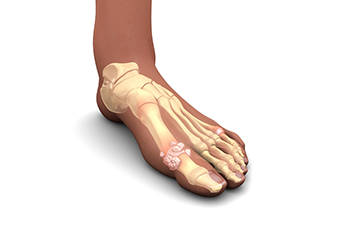
Gout is a form of arthritis caused by the buildup of uric acid crystals in the joints, leading to intense pain and inflammation. This condition often results from high levels of uric acid in the blood, which can be triggered by factors such as excessive consumption of purine-rich foods, like red meat and seafood, and alcohol. The symptoms of gout include sudden, severe pain in the affected joint, often the big toe, along with redness, swelling, and warmth. To prevent gout attacks, it is vital to maintain a healthy diet low in purines, stay hydrated, and limit alcohol intake. Regular exercise and managing body weight can also reduce the risk of developing gout. If you have had one or frequent gout attacks, it is strongly suggested that you are under the care of a podiatrist who can help you to manage this condition.
Gout is a foot condition that requires certain treatment and care. If you are seeking treatment, contact one of our podiatrists from Livingston Footcare. Our doctors will treat your foot and ankle needs.
What Is Gout?
Gout is a type of arthritis caused by a buildup of uric acid in the bloodstream. It often develops in the foot, especially the big toe area, although it can manifest in other parts of the body as well. Gout can make walking and standing very painful and is especially common in diabetics and the obese.
People typically get gout because of a poor diet. Genetic predisposition is also a factor. The children of parents who have had gout frequently have a chance of developing it themselves.
Gout can easily be identified by redness and inflammation of the big toe and the surrounding areas of the foot. Other symptoms include extreme fatigue, joint pain, and running high fevers. Sometimes corticosteroid drugs can be prescribed to treat gout, but the best way to combat this disease is to get more exercise and eat a better diet.
If you have any questions please feel free to contact our office located in North Brunswick, NJ . We offer the newest diagnostic and treatment technologies for all your foot and ankle needs.
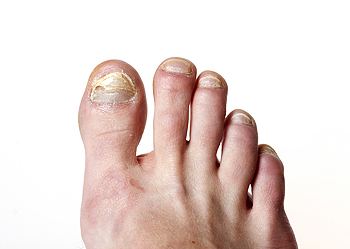
Fungi, which reside on the body, can thrive over time in or on the toenail. This can result in an infection known as onychomycosis, or fungal toenail. You can also pick up onychomycosis through contact with someone who has it. Additionally, this fungal infection can be transmitted through contact with toenail clippers, nail files, or pedicure instruments at a salon where fungi are present. Older adults whose drier nails make it easier for fungi to enter the nail are more prone to developing fungal toenail infections. Additionally, people who wear fake nails, use public swimming pools, or have diabetes or a weakened immune system may be successiptble to developing toenail fungus. People whose feet are confined to warm, moist environments where fungi thrive are also more at risk of developing fungal nails. Fungal nail symptoms include brittle, thickened, discolored or distorted nails, which can sometimes be accompanied by odor or pain. While some people try to treat fungal toenail infections at home, the fungi can be very stubborn and resilient. If you have toenail fungus, It is suggested that you schedule an appointment with a podiatrist to address the issue and prevent it from recurring.
For more information about treatment, contact one of our podiatrists of Livingston Footcare. Our doctors can provide the care you need to keep you pain-free and on your feet.
Toenail Fungus Treatment
Toenail fungus is a condition that affects many people and can be especially hard to get rid of. Fortunately, there are several methods to go about treating and avoiding it.
Antifungals & Deterrence
Oral antifungal medicine has been shown to be effective in many cases. It is important to consult with a podiatrist to determine the proper regiment for you, or potentially explore other options.
Applying foot powder on the feet and shoes helps keep the feet free of moisture and sweat.
Sandals or open toed shoes – Wearing these will allow air movement and help keep feet dry. They also expose your feet to light, which fungus cannot tolerate. Socks with moisture wicking material also help as well.
If you have any questions please feel free to contact our office located in North Brunswick, NJ . We offer the newest diagnostic tools and technology to treat your foot and ankle needs.

Using a treadmill can lead to various foot injuries due to repetitive stress and improper use. One common injury is plantar fasciitis, which causes heel pain from inflammation of the tissue connecting the heel to the toes. Another frequent issue is metatarsalgia, characterized by pain in the ball of the foot, often caused by excessive impact or poor foot alignment. Achilles tendinitis, an inflammation of the tendon at the back of the ankle, can also occur from overuse or wearing improper footwear. Ankle sprains may result from sudden changes in direction or loss of balance. To prevent these injuries, ensure proper treadmill use with a suitable speed and incline, wear supportive and well-fitted shoes, and incorporate stretching and strengthening exercises into your routine. If you have sustained a foot injury from running on the treadmill, it is suggested that you contact a podiatrist who can treat your foot condition and educate you on specific running injury prevention methods.
All runners should take extra precaution when trying to avoid injury. If you have any concerns about your feet, contact one of our podiatrists of Livingston Footcare. Our doctors will treat your foot and ankle needs.
How to Prevent Running Injuries
There are a lot of mistakes a runner can make prior to a workout that can induce injury. A lot of athletes tend to overstretch before running, instead of saving those workouts for a post-run routine. Deep lunges and hand-to-toe hamstring pulls should be performed after a workout instead of during a warmup. Another common mistake is jumping into an intense routine before your body is physically prepared for it. You should try to ease your way into long-distance running instead of forcing yourself to rush into it.
More Tips for Preventing Injury
If you have any questions, please feel free to contact our office located in North Brunswick, NJ . We offer the newest diagnostic and treatment technologies for all your foot care needs.
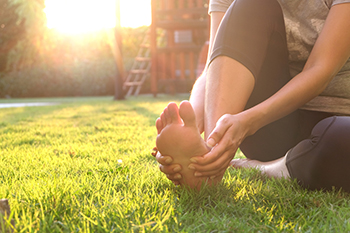
Pain in various parts of the foot can stem from diverse factors. Heel pain, often attributed to plantar fasciitis, results from inflammation of the thick band of tissue connecting the heel to the toes. Arch pain may indicate issues like flat feet or overpronation, where the arch collapses excessively during walking or running. Pain in the ball of the foot could be due to conditions such as metatarsalgia, a result of excessive pressure on the ball of the foot. Additionally, toe pain may result from conditions like bunions, hammertoes, or ingrown toenails. Ankle pain can be caused by sprains, fractures, or Achilles tendon injuries. Contributing factors include overuse, improper footwear, structural abnormalities, and injuries. A diagnosis by a podiatrist is essential for determining the underlying cause of foot pain. If you have pain in your feet, it is strongly urged that you consult this type of doctor who can accurately diagnose and treat foot pain.
Foot Pain
Foot pain can be extremely painful and debilitating. If you have a foot pain, consult with one of our podiatrists from Livingston Footcare. Our doctors will assess your condition and provide you with quality foot and ankle treatment.
Causes
Foot pain is a very broad condition that could be caused by one or more ailments. The most common include:
Diagnosis
To figure out the cause of foot pain, podiatrists utilize several different methods. This can range from simple visual inspections and sensation tests to X-rays and MRI scans. Prior medical history, family medical history, and any recent physical traumatic events will all be taken into consideration for a proper diagnosis.
Treatment
Treatment depends upon the cause of the foot pain. Whether it is resting, staying off the foot, or having surgery; podiatrists have a number of treatment options available for foot pain.
If you have any questions, please feel free to contact our office located in North Brunswick, NJ . We offer the newest diagnostic and treatment technologies for all your foot care needs.
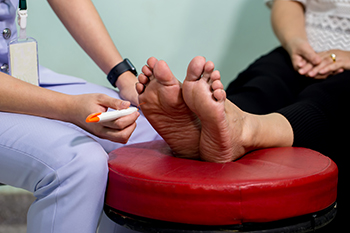
Peripheral neuropathy, which arises from damaged or diseased peripheral nerves, significantly impacts the feet by disrupting the transmission of signals from the brain. Symptoms of peripheral neuropathy can include numbness, tingling, sharp pain, and muscle weakness in the feet. Such symptoms can make everyday activities challenging, and may cause balance issues or foot injuries that are unnoticed due to loss of sensation. The underlying causes of peripheral neuropathy are diverse, with diabetes being a prevalent factor. An early diagnosis and treatment of peripheral neuropathy is vital to manage symptoms and prevent further nerve damage. A podiatrist can perform a thorough exam and order diagnostic tests to develop a comprehensive treatment plan for you. This may include medication or lifestyle modifications to alleviate discomfort and improve mobility. If you have peripheral neuropathy that affects your feet, it is suggested that you schedule an appointment with a podiatrist for an exam and treatment.
Neuropathy
Neuropathy can be a potentially serious condition, especially if it is left undiagnosed. If you have any concerns that you may be experiencing nerve loss in your feet, consult with one of our podiatrists from Livingston Footcare. Our doctors will assess your condition and provide you with quality foot and ankle treatment for neuropathy.
What Is Neuropathy?
Neuropathy is a condition that leads to damage to the nerves in the body. Peripheral neuropathy, or neuropathy that affects your peripheral nervous system, usually occurs in the feet. Neuropathy can be triggered by a number of different causes. Such causes include diabetes, infections, cancers, disorders, and toxic substances.
Symptoms of Neuropathy Include:
Those with diabetes are at serious risk due to being unable to feel an ulcer on their feet. Diabetics usually also suffer from poor blood circulation. This can lead to the wound not healing, infections occurring, and the limb may have to be amputated.
Treatment
To treat neuropathy in the foot, podiatrists will first diagnose the cause of the neuropathy. Figuring out the underlying cause of the neuropathy will allow the podiatrist to prescribe the best treatment, whether it be caused by diabetes, toxic substance exposure, infection, etc. If the nerve has not died, then it’s possible that sensation may be able to return to the foot.
Pain medication may be issued for pain. Electrical nerve stimulation can be used to stimulate nerves. If the neuropathy is caused from pressure on the nerves, then surgery may be necessary.
If you have any questions, please feel free to contact our office located in North Brunswick, NJ . We offer the newest diagnostic and treatment technologies for all your foot care needs.
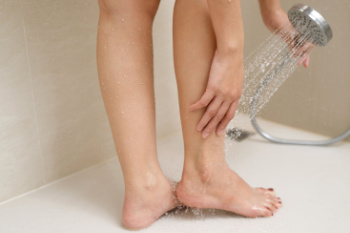
Maintaining proper foot hygiene is essential for overall health and comfort. Everyday foot care can begin with regularly washing feet with soap and water. This can help to remove dirt and bacteria, reducing the risk of infections. Thoroughly drying feet, especially between the toes, prevents fungal growth. Wearing clean, moisture-wicking socks can keep feet dry and comfortable throughout the day. Properly fitting shoes that provide adequate support can help to prevent blisters and calluses. Regularly trimming toenails straight across reduces the risk of ingrown nails. Moisturizing feet daily keeps skin supple and prevents cracks. Checking feet for any cuts, blisters, or changes in appearance can catch potential issues early. Foot conditions may develop from a lack of proper foot care. If this applies to you, it is suggested that you consult a podiatrist who can treat any foot ailment, and guide you on effective foot care routines.
Everyday foot care is very important to prevent infection and other foot ailments. If you need your feet checked, contact one of our podiatrists from Livingston Footcare. Our doctors can provide the care you need to keep you pain-free and on your feet.
Everyday Foot Care
Often, people take care of their bodies, face and hair more so than they do for their feet. But the feet are a very important aspect of our bodies, and one that we should pay more attention to. Without our feet, we would not be able to perform most daily tasks.
It is best to check your feet regularly to make sure there are no new bruises or cuts that you may not have noticed before. For dry feet, moisturizer can easily be a remedy and can be applied as often as necessary to the affected areas. Wearing shoes that fit well can also help you maintain good foot health, as well as making it easier to walk and do daily activities without the stress or pain of ill-fitting shoes, high heels, or even flip flops. Wearing clean socks with closed shoes is important to ensure that sweat and bacteria do not accumulate within the shoe. Clean socks help to prevent Athlete’s foot, fungi problems, bad odors, and can absorb sweat.
If you have any questions please feel free to contact our office located in North Brunswick, NJ . We offer the newest diagnostic and treatment technologies for all your foot and ankle needs.
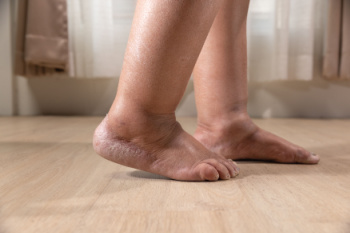
Swollen feet and ankles are a common issue with a variety of causes. Injuries such as sprains or fractures can lead to immediate swelling due to tissue damage and inflammation. Diseases, including heart, liver, or kidney problems, can cause fluid retention, leading to swelling in the feet and ankles. Infections, especially in individuals with diabetes or compromised immune systems, can also result in swelling in these areas. Certain medications, such as those for blood pressure or hormonal therapy, can cause fluid retention and swelling as a side effect. Pregnancy often leads to swollen feet due to increased body fluid and pressure from the growing uterus. Edema, the medical term for fluid buildup in tissues, can be caused by prolonged standing, sitting, or underlying health conditions. If your feet or ankles have become swollen, it is suggested that you visit a podiatrist who can determine what the reason is, and offer appropriate treatment remedies.
Swollen feet can be a sign of an underlying condition. If you have any concerns, contact one of our podiatrists of Livingston Footcare. Our doctors can provide the care you need to keep you pain-free and on your feet.
Swollen feet are a common ailment among pregnant women and people who stand or sit for extended periods. Aging may increase the possibility of swollen feet and patients who are obese often notice when their feet are swelling too. There may be medical reasons why swollen feet occur:
Swollen feet can also be caused by bone and tendon conditions, including fractures, arthritis, and tendinitis. Additionally, there may be skin and toenail conditions and an infection may cause the feet to swell. Patients who take medicine to treat high blood pressure may be prone to getting swollen feet.
Many patients elevate their feet to help relieve the swelling and this is generally a temporary remedy. When a podiatrist is consulted the reason behind the swelling can be uncovered and subsequently treated.
If you have any questions please feel free to contact our office located in North Brunswick, NJ . We offer the newest diagnostic tools and technology to treat your foot and ankle needs.
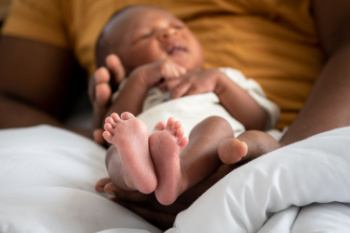 Newborn foot care is essential for ensuring proper development and identifying any abnormalities early. Immediately after birth, a thorough examination of the newborn's feet is conducted by healthcare professionals. This examination includes assessing the shape, size, and position of the feet and checking for movement, reflexes, and the presence of any deformities. Common abnormalities detected during this examination include clubfoot, where the foot is twisted out of shape or position, and flexible flatfoot, where the arch of the foot is not developed. Early detection allows for prompt intervention, which may include stretching exercises, casting, or, in severe cases, surgical correction. Proper foot care, including keeping the feet clean and dry, avoiding tight footwear, and monitoring for any changes, is essential for newborns. If you have any concerns about your newborn’s foot health, it is suggested that you schedule an appointment with a podiatrist to discuss appropriate care and treatment options.
Newborn foot care is essential for ensuring proper development and identifying any abnormalities early. Immediately after birth, a thorough examination of the newborn's feet is conducted by healthcare professionals. This examination includes assessing the shape, size, and position of the feet and checking for movement, reflexes, and the presence of any deformities. Common abnormalities detected during this examination include clubfoot, where the foot is twisted out of shape or position, and flexible flatfoot, where the arch of the foot is not developed. Early detection allows for prompt intervention, which may include stretching exercises, casting, or, in severe cases, surgical correction. Proper foot care, including keeping the feet clean and dry, avoiding tight footwear, and monitoring for any changes, is essential for newborns. If you have any concerns about your newborn’s foot health, it is suggested that you schedule an appointment with a podiatrist to discuss appropriate care and treatment options.
Making sure that your children maintain good foot health is very important as they grow. If you have any questions, contact one of our podiatrists of Livingston Footcare. Our doctors can provide the care you need to keep you pain-free and on your feet.
Keeping Children's Feet Healthy
Having healthy feet during childhood can help prevent medical problems later in life, namely in the back and legs. As children grow, their feet require different types of care. Here are some things to consider...
Although babies do not walk yet, it is still very important to take care of their feet.
Avoid putting tight shoes or socks on his or her feet.
Allow the baby to stretch and kick his or her feet to feel comfortable.
As a toddler, kids are now on the move and begin to develop differently. At this age, toddlers are getting a feel for walking, so don’t be alarmed if your toddler is unsteady or ‘walks funny’.
As your child gets older, it is important to teach them how to take care of their feet.
Show them proper hygiene to prevent infections such as fungus.
Be watchful for any pain or injury.
Have all injuries checked by a doctor as soon as possible.
Comfortable, protective shoes should always be worn, especially at play.
If you have any questions please feel free to contact our office located in North Brunswick, NJ . We offer the newest diagnostic and treatment technologies for all your foot and ankle needs.
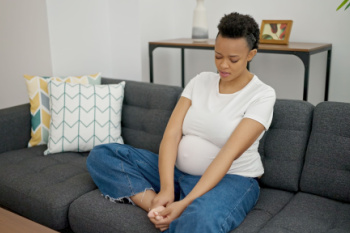
Pregnancy brings numerous changes to a woman's body, often leading to foot problems. One of the most common issues is flat feet, or overpronation, where increased body weight causes the foot arch to flatten and the feet to roll inward. This can result in pain and additional strain on the feet, calves, and back. Wearing supportive footwear and using orthotics can help alleviate this discomfort. Swelling, or edema, typical in the second or third trimester, results from increased blood volume and pressure, leading to water retention in the legs and feet. Regular movement, elevating the feet, staying hydrated, and reducing salt intake can help reduce swelling. Pregnant women are also prone to developing ingrown toenails due to changes in foot size and shape, often worsened by tighter shoes. Soaking feet in salt water and having toenails properly trimmed can offer relief. Additionally, some women experience hot or burning sensations in their feet due to hormonal changes and increased body temperature. Cracked heels might develop from the added weight and posture changes that cause dry skin and heel expansion. Moisturizing and wearing comfortable shoes can prevent and treat these cracks. If you are experiencing foot pain during pregnancy, it is suggested that you schedule an appointment with a podiatrist for an exam and appropriate treatment.
Pregnant women with swollen feet can be treated with a variety of different methods that are readily available. For more information about other cures for swollen feet during pregnancy, consult with one of our podiatrists from Livingston Footcare. Our doctors will attend to all of your foot and ankle needs.
What Foot Problems Can Arise During Pregnancy?
One problem that can occur is overpronation, which occurs when the arch of the foot flattens and tends to roll inward. This can cause pain and discomfort in your heels while you’re walking or even just standing up, trying to support your baby.
Another problem is edema, or swelling in the extremities. This often affects the feet during pregnancy but tends to occur in the later stages.
How Can I Keep My Feet Healthy During Pregnancy?
If you have any questions please feel free to contact our office located in North Brunswick, NJ . We offer the newest diagnostic and treatment technologies for all your foot and ankle needs.
 Achilles tendinopathy is a condition characterized by pain, swelling, and stiffness in the Achilles tendon, which connects the calf muscles to the heel bone. This condition often results from overuse, particularly in athletes and individuals who engage in repetitive activities such as running or jumping. It can also arise from a sudden increase in physical activity, wearing poor footwear, or biomechanical issues like flat feet. The pain associated with Achilles tendinopathy usually starts as a mild ache above the heel or in the back of the leg, worsening with activity. The condition can range from mild inflammation to more severe degeneration of the tendon fibers. Diagnosis typically involves a physical examination and imaging tests, such as ultrasound or MRI scans to assess the extent of the damage. Treatment options include rest, targeted exercises, and nonsteroidal anti-inflammatory drugs. In severe cases, surgery may be required to repair the tendon. Preventative measures include proper warm-up routines, wearing appropriate footwear, and gradually increasing the intensity of physical activity. If you experience symptoms of Achilles tendinopathy, it is suggested that you schedule an appointment to see a podiatrist for an accurate diagnosis and effective treatment plan.
Achilles tendinopathy is a condition characterized by pain, swelling, and stiffness in the Achilles tendon, which connects the calf muscles to the heel bone. This condition often results from overuse, particularly in athletes and individuals who engage in repetitive activities such as running or jumping. It can also arise from a sudden increase in physical activity, wearing poor footwear, or biomechanical issues like flat feet. The pain associated with Achilles tendinopathy usually starts as a mild ache above the heel or in the back of the leg, worsening with activity. The condition can range from mild inflammation to more severe degeneration of the tendon fibers. Diagnosis typically involves a physical examination and imaging tests, such as ultrasound or MRI scans to assess the extent of the damage. Treatment options include rest, targeted exercises, and nonsteroidal anti-inflammatory drugs. In severe cases, surgery may be required to repair the tendon. Preventative measures include proper warm-up routines, wearing appropriate footwear, and gradually increasing the intensity of physical activity. If you experience symptoms of Achilles tendinopathy, it is suggested that you schedule an appointment to see a podiatrist for an accurate diagnosis and effective treatment plan.
Achilles tendon injuries need immediate attention to avoid future complications. If you have any concerns, contact one of our podiatrists of Livingston Footcare. Our doctors can provide the care you need to keep you pain-free and on your feet.
What Is the Achilles Tendon?
The Achilles tendon is a tendon that connects the lower leg muscles and calf to the heel of the foot. It is the strongest tendon in the human body and is essential for making movement possible. Because this tendon is such an integral part of the body, any injuries to it can create immense difficulties and should immediately be presented to a doctor.
What Are the Symptoms of an Achilles Tendon Injury?
There are various types of injuries that can affect the Achilles tendon. The two most common injuries are Achilles tendinitis and ruptures of the tendon.
Achilles Tendinitis Symptoms
Rupture Symptoms
Treatment and Prevention
Achilles tendon injuries are diagnosed by a thorough physical evaluation, which can include an MRI. Treatment involves rest, physical therapy, and in some cases, surgery. However, various preventative measures can be taken to avoid these injuries, such as:
If you have any questions please feel free to contact our office located in North Brunswick, NJ . We offer the newest diagnostic tools and technology to treat your foot and ankle needs.

Ballerinas often face various foot injuries due to the intense demands of ballet. One common injury is the stress fracture, resulting from repetitive impact and overuse, particularly in the metatarsal bones. Tendonitis, especially affecting the Achilles tendon, occurs from overextension and strain during jumps and pointe work. Blisters and calluses develop from friction against tight-fitting ballet shoes. Additionally, sprained ankles are frequent due to the constant balancing and quick directional changes. Sesamoiditis, an inflammation of the small bones beneath the big toe, is another injury caused by the pressure of pointe work. Plantar fasciitis, characterized by heel pain, results from excessive strain on the arch of the foot. These injuries highlight the physical challenges ballerinas face, emphasizing the importance of proper technique, conditioning, and foot care in their training. Foot pain can temporarily stop a dancer’s movements. If this applies to you, it is suggested that you confer with a podiatrist who can provide you with relief and treatment methods.
Foot Pain
Foot pain can be extremely painful and debilitating. If you have a foot pain, consult with one of our podiatrists from Livingston Footcare. Our doctors will assess your condition and provide you with quality foot and ankle treatment.
Causes
Foot pain is a very broad condition that could be caused by one or more ailments. The most common include:
Diagnosis
To figure out the cause of foot pain, podiatrists utilize several different methods. This can range from simple visual inspections and sensation tests to X-rays and MRI scans. Prior medical history, family medical history, and any recent physical traumatic events will all be taken into consideration for a proper diagnosis.
Treatment
Treatment depends upon the cause of the foot pain. Whether it is resting, staying off the foot, or having surgery; podiatrists have a number of treatment options available for foot pain.
If you have any questions, please feel free to contact our office located in North Brunswick, NJ . We offer the newest diagnostic and treatment technologies for all your foot care needs.